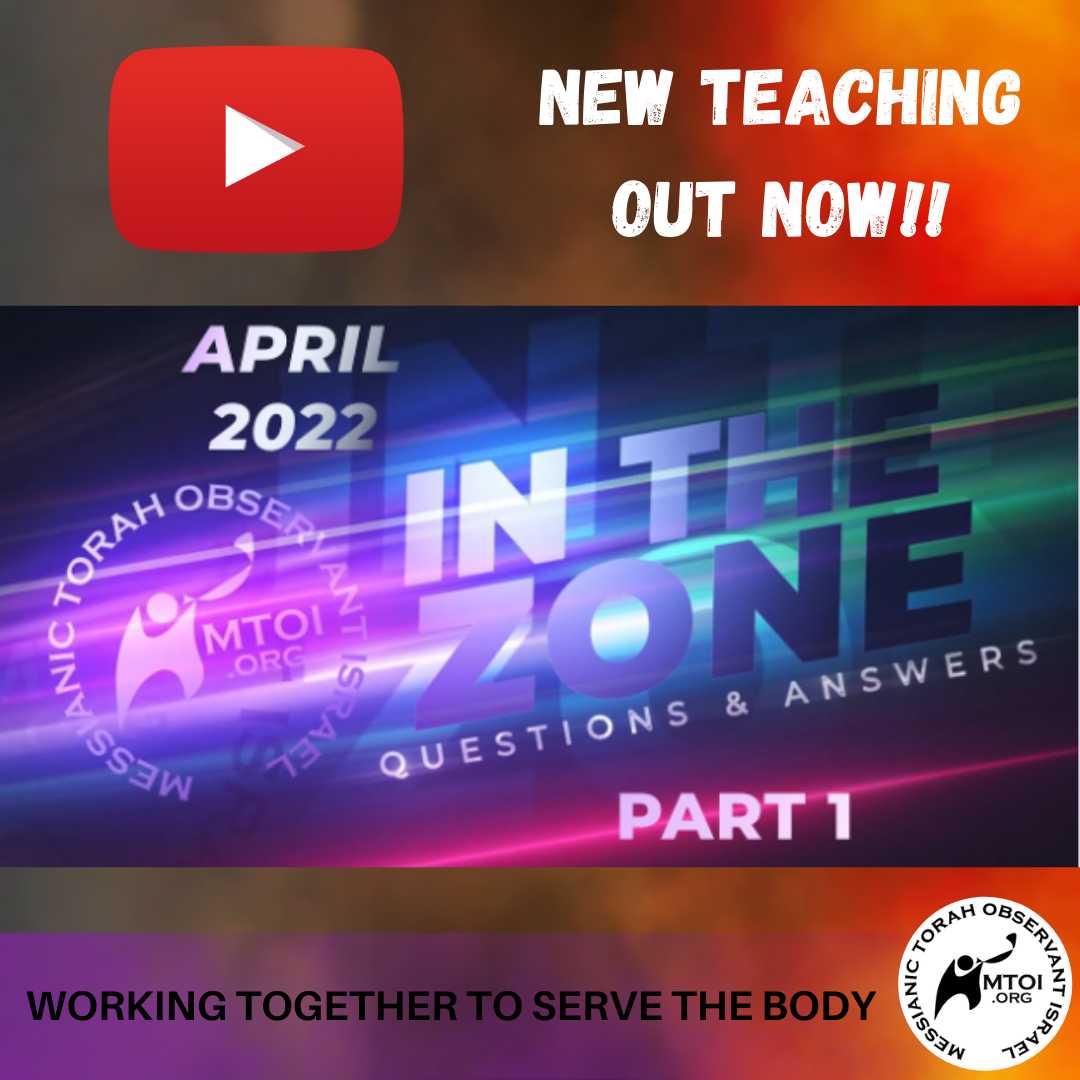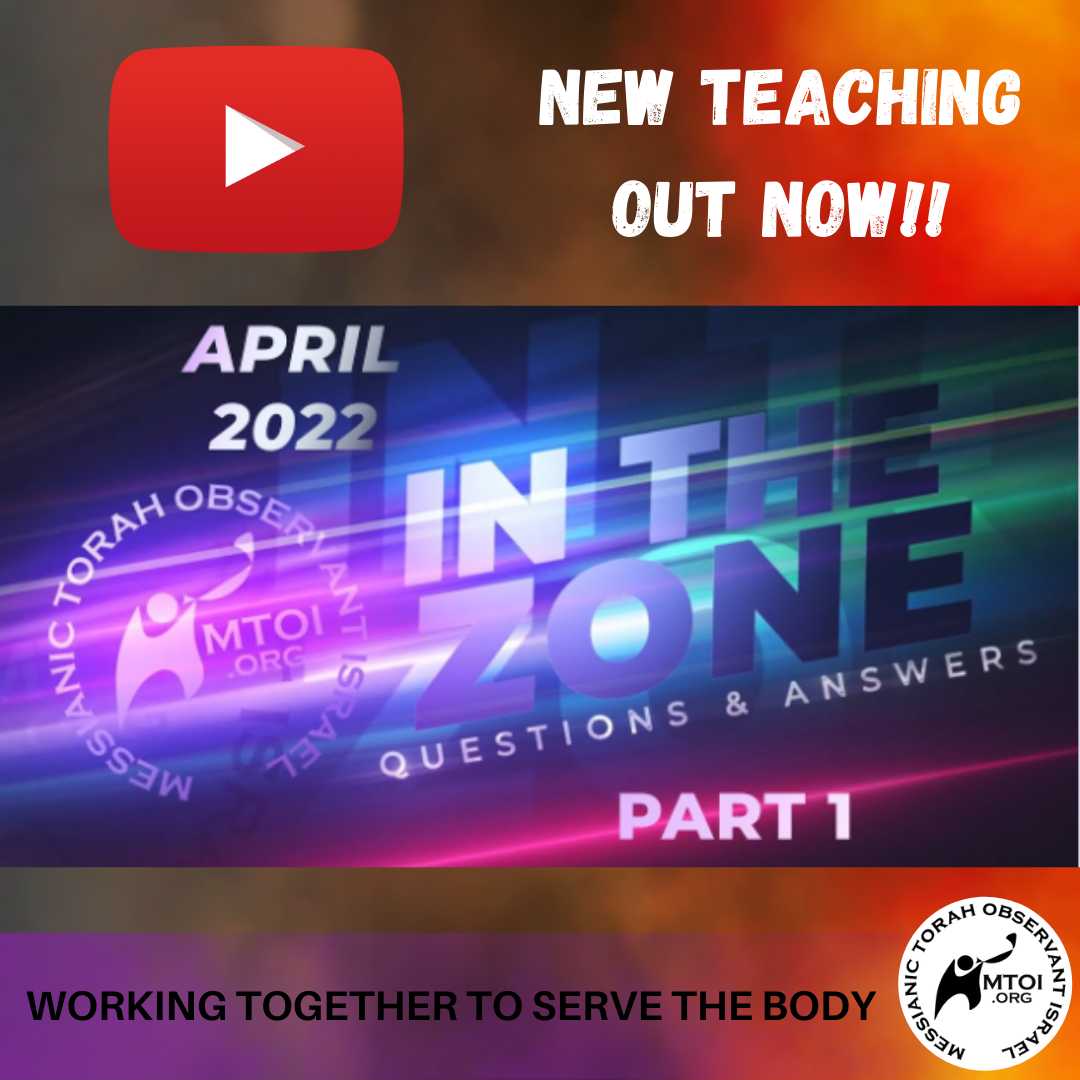Watch
Events
Articles
Market
More
Thought for Today: Thursday May 05: Day 19 of the Omer:
Moshiach came into a world that had problems much like the ones we grapple with today and every day. To those without the joy of living, Yeshua said: [I have come that they may have life and that they may have it more abundantly] – John 10:10. To those who bore the chafing burden of guilt of sin, He said: [Be of good cheer, your sins are forgiven you] – Matthew 9:2. To the friendless He said: [No longer do I call you servants… but I call you friends] – John 15:15. Moshiach still comes to us to cleanse our guilt, give us hope for the future and heal our hurts with His Love. So, make time today, sit down with Him and tell Him everything that concerns you. Be blessed!



Parable #18. The Fish Net (Kingdom of Heaven):
https://ha-mashiach.com/messia....h-in-yom-habikkurim/




Parable #19. Owner of a House (Kingdom of Heaven):
https://ha-mashiach.com/messia....h-in-yom-habikkurim/




Are you staying connected with Triumph In Truth Ministries? There are several ways you can. Click the link to find out how! www.triumphintruth.global/stayconnected




I was able to secure 12 non sexed chicks. They are going to meet us in town on Sunday and we can pick them up. I just finished making a brood box out of mostly waste products and things I had lying around. I modified a humming bird feeder for the waterer. I used disposable plastic containers to make a feeder. Cardboard box for the structure. A broken 5 gallon pail to go around the oil/electric heater. I mounted my outdoor thermometer to make sure these guys get the right temperature for their age. I will add some movable cover to the opening to keep heat in.
I looked it up and you start at 95 F and then decrease by 5degrees for every week old until 6 weeks.
I am trying to do more with less. I think these skills will be needed in next few years.




I was able to secure 12 non sexed chicks. They are going to meet us in town on Sunday and we can pick them up. I just finished making a brood box out of mostly waste products and things I had lying around. I modified a humming bird feeder for the waterer. I used disposable plastic containers to make a feeder. Cardboard box for the structure. A broken 5 gallon pail to go around the oil/electric heater. I mounted my outdoor thermometer to make sure these guys get the right temperature for their age. I will add some movable cover to the opening to keep heat in.
I looked it up and you start at 95 F and then decrease by 5degrees for every week old until 6 weeks.
I am trying to do more with less. I think these skills will be needed in next few years.




I was able to secure 12 non sexed chicks. They are going to meet us in town on Sunday and we can pick them up. I just finished making a brood box out of mostly waste products and things I had lying around. I modified a humming bird feeder for the waterer. I used disposable plastic containers to make a feeder. Cardboard box for the structure. A broken 5 gallon pail to go around the oil/electric heater. I mounted my outdoor thermometer to make sure these guys get the right temperature for their age. I will add some movable cover to the opening to keep heat in.
I looked it up and you start at 95 F and then decrease by 5degrees for every week old until 6 weeks.
I am trying to do more with less. I think these skills will be needed in next few years.
Oh yah I will add wood chips on the bottom.





Has anyone else seen this? Such a great step for the homeschooling movement! I'm awaiting communication from the GM of our local theater to see if our homeschool group (and others) can hand out homeschool information as people come out from seeing this.
https://www.fathomevents.com/e....vents/Kirk-Cameron-P



Link to teaching - https://youtu.be/MN9PqJxuYwE
On the first Shabbat of the month Rabbi Steve Berkson opens the floor to the local congregants and those listening online to ask questions or make comments about any aspect of our belief.
Rabbi Berkson addresses topics about fundamental Torah-based practices, personal development, gives marital instruction, shares parental techniques and more.
Part 1:
00: 00 Intro/Forming opinions without all the facts?
05:50 Is ‘Zion’ the representation of the Kingdom of Messiah?
08:34 Can Genesis 1:11 apply to other things than just plants?
11:34 Does “empty handed” apply to Shabbat or just the feasts?
26:35 You can’t see beyond a certain point
36:59 Discerning signs or seeking after a sign?
42:30 How do I observe the Purity Laws today?
44:46 Is there any scriptural reason to avoid jury duty?
46: 01 Baptism and using the “names”
Links to related and suggested teachings:
• Hitting the Target https://youtu.be/JaEfOj9UyJg
• Tithing: Appreciating Blessings https://www.youtube.com/playlist?list...
• Do You Know the Father and the Son? https://www.youtube.com/playlist?list...
Don't miss out on new teachings every week. Please click on the "LIKE" button if this video has been a blessing to you.
For more information about MTOI (Messianic Torah Observant Israel), visit our website, https://mtoi.org.
Join us on Social media!
Like us on Facebook: https://www.facebook.com/mtoiworldwide
Follow us on Instagram: https://www.instagram.com/mtoiworldwide/
Follow us on Twitter: https://twitter.com/mtoiworldwide
Join us on The Torah Network: https://social.ttn.place/mtoiworldwide
https://social.ttn.place/mtoisouthafrica
Join us on Telegram: https://t.me/mtoiworldwide and https://t.me/mtoisouthafrica
We are located in Cleveland TN, and have extension fellowships across South Africa. If you would like to know more about us, we would love to hear from you! Feel free to visit us on our website https://mtoi.org/mtoi-map/, to see where they are located, email us at contact.sa@mtoi.org or call us at 081 471 8940.
.
.
.
#midweekmotivation #Torah #Yahweh #Yeshua #Elohim #Messiah #messianic #torahobservant #clevelandtn #mtoiworldwide #inthezone




Link to teaching - https://youtu.be/MN9PqJxuYwE
On the first Shabbat of the month Rabbi Steve Berkson opens the floor to the local congregants and those listening online to ask questions or make comments about any aspect of our belief.
Rabbi Berkson addresses topics about fundamental Torah-based practices, personal development, gives marital instruction, shares parental techniques and more.
Part 1:
00: 00 Intro/Forming opinions without all the facts?
05:50 Is ‘Zion’ the representation of the Kingdom of Messiah?
08:34 Can Genesis 1:11 apply to other things than just plants?
11:34 Does “empty handed” apply to Shabbat or just the feasts?
26:35 You can’t see beyond a certain point
36:59 Discerning signs or seeking after a sign?
42:30 How do I observe the Purity Laws today?
44:46 Is there any scriptural reason to avoid jury duty?
46: 01 Baptism and using the “names”
Links to related and suggested teachings:
• Hitting the Target https://youtu.be/JaEfOj9UyJg
• Tithing: Appreciating Blessings https://www.youtube.com/playlist?list...
• Do You Know the Father and the Son? https://www.youtube.com/playlist?list...
Don't miss out on new teachings every week. Please click on the "LIKE" button if this video has been a blessing to you.
For more information about MTOI (Messianic Torah Observant Israel), visit our website, https://mtoi.org.
Join us on Social media!
Like us on Facebook: https://www.facebook.com/mtoiworldwide
Follow us on Instagram: https://www.instagram.com/mtoiworldwide/
Follow us on Twitter: https://twitter.com/mtoiworldwide
Join us on The Torah Network: https://social.ttn.place/mtoiworldwide
Join us on Telegram: https://t.me/mtoiworldwide
We are located in Cleveland TN. If you would like to know more about us, we would love to hear from you! Feel free to visit us on our website, https://mtoi.org, email us at admin@mtoi.org or call us at 423-250-3020.
.
.
.
#midweekmotivation #Torah #Yahweh #Yeshua #Elohim #Messiah #messianic #torahobservant #clevelandtn #mtoiworldwide #inthezone



